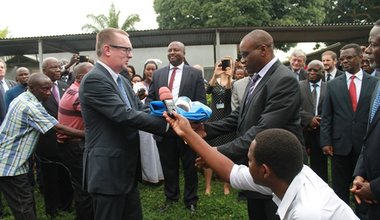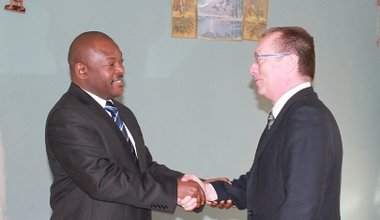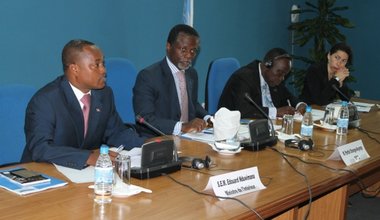Burundi looked "immeasurably different" from the conflict-ravaged country of a few years ago, but "decisive and confident leadership" was required to consolidate governance that allowed dissent, shunned corruption and spurred development, the Secretary-General's Special Representative told the Security Council this morning.
"This fragile, beautiful and courageous country has travelled a long and difficult distance along the road of peace consolidation in a little over a decade", Karin Landgren, who is also the head of the United Nations Office in Burundi (BNUB), said in her final briefing to the Council in that position. She added, however, that "It should no longer surprise us that war-torn countries do not put away their weapons and blossom instantly as plural and stable democracies."
Ms. Landgren, who addressed the Council ahead of the Chair of the Burundi Configuration of the Peacebuilding Commission and the representative of Burundi, said that the country had continued to advance critical peacebuilding and development strategies and had remained free of large-scale violence, with the Government consolidating security throughout the territory, but the continuing violent incidents, particularly politically-related extrajudicial killings, were worrisome. Political dialogue, human rights concerns of the past and present, and public financial management remained paramount concerns, as well as considerations of meeting the benchmarks for transition from BINUB to a United Nations country team.
Looking ahead to the 2015 elections, she said that the United Nations had continued to encourage the normalization of relations among all political parties and groups. There was an urgent need to ensure free exercise of political expression; she pointed to documented instances in which political parties had been prevented from carrying out their activities in various areas, as well as politically-related killings.
Since late March, however, she said that there had been several direct interactions among members of the ruling party and the extra-parliamentary opposition, accompanied by a generally more moderate tone on all sides. BNUB looked forward to working with all partners for further normalization, utilizing the lessons learned in the 2010 elections. Also, with assistance from the United Nations, a technical committee had been set up by the Ministry of the Interior to provide a regular framework for dialogue with civil society groups, which had threatened agitation due to sharp rises in the price of food and utilities.
On human rights, she said the country continued to make progress, through the National Independent Human Rights Commission, set up in June 2011, which had already investigated several sensitive cases involving the security forces. Violations persisted however, including extrajudicial executions, torture and the excessive use of force, as well as impunity for such crimes, due to lack of independence of the judiciary and significant capacity gaps.
Most of the 13 extrajudicial killings documented so far this year, she said, were apparently perpetrated by members of the police, including six killed in alleged prison escapes. Documented torture cases had dropped to 11, with 36 in the same period last year. In the murder of anti-corruption leader Ernest Manirumva, a verdict was handed down in May, with 14 lengthy sentences handed down, but, at the same time, lines of inquiry that possibly pertained to high officials had not been followed up on.
There had been some progress in the judicial system, she said, including a plan to enhance independence, access and strengthening of criminal justice, as well as a new code of penal procedure. BNUB and partners continued to support the professionalization of magistrates as part of a comprehensive strategy for justice sector reform that focused on technical assistance to relieve prison overcrowding and pre-trial detention, which had already had significant effects. Preparations were being made for a national conference on justice, supported by BNUB, and she anticipated an inclusive and transparent national debate.
In regard to transitional justice, she remained confident that the country would fulfil the commitments made at Arusha in 2000. Critical issues included the exclusion from amnesty of those guilty of grave crimes, the creation of an inclusive Truth and Reconciliation Commission, the establishment of a Special Tribunal and the protection of victims and witnesses. The President had indicated that the Commission would be set up before the end of 2012 and the Government had said a law is under consideration.
Strengthened public administration was needed to accelerate equitable economic development, she said. The Government had stated its intention of erasing Burundi from the list of the world's poorest countries by 2020. In 2011, Burundi moved up in the rankings of ease for doing business and tax collection had been improved, although the tax office had faced some political obstacles. Progress had also been made in creating a legal and institutional framework to fight corruption.
Extreme socio-economic difficulty characterized the life of most Burundians, she said. Food insecurity persisted and an overwhelming reliance on agriculture coupled with a high birth rate created extraordinary pressures on land and resources. This year an estimated 35,400 refugees were expected to return from the United Republic of Tanzania, with the national body that handles land disputes adjudicating many difficult cases. As a result, the latest Poverty Reduction Strategy included the development of livelihoods beyond agriculture, with a focus on education for that purpose. A conference for development partners, supported by the United Nations, was planned for late October.
In regard to eventual transition to a regular United Nations country team, benchmarks had already been communicated to the Council in May, she noted, which seek to capture the broad range of endeavours relevant to stability. BNUB anticipated further refining those related to its own role, as opposed to those of the country team and, within six months, the Office anticipated providing baseline data and assessments, with observations on timing and trends for each issue and on BNUB's role where appropriate.
Following Ms. Landgren's briefing, Paul Seger, Chairperson of the Burundi configuration of the Peacebuilding Commission, congratulated the country on its 50 years of independence. His recent visit to Burundi in mid-April had confirmed that the situation overall had stabilized and some progress had been made towards consolidating peace. The people's greatest concern was the socio-economic situation and rising prices. The Configuration was compiling its conclusions and recommendations for its annual review of the Outcome Document, which defined the commitments of the Government and the Configuration. The anticipation of the development partners' conference, to be held in Geneva on 29 and 30 October, was to assist Burundi by mobilizing as many Member States as possible to support the second Poverty Reduction and Strategy Paper.
He said the political situation was improving, and he had the impression that the "political mood" was more relaxed. The Government and its majority party, the CNDD-FDD (National Council for the Defence of Democracy-Forces for the Defence of Democracy), seemed to have recognized the advantages of giving the opposition more room in connection with the elections in 2015. The prospects for the political landscape were indeed returning to normal. The return from exile of one opposition politician seemed to confirm that new positive development. However, some fundamental ground remained to be covered in the relationship between the governmental party and the opposition, which was not represented in Parliament. Respect for human rights also needed to improve. He was hopeful about recent developments and felt "from here on we must preserve this still-fragile progress and support all those who are reaching out in preparation for peaceful and inclusive elections in 2015".
Meanwhile, "life is expensive" was heard everywhere, he noted. Price rises of raw materials and food were endangering social stability. The Government, aware of the risks, had temporarily lifted the tax on certain basic life essentials and would create a tax on certain products, such as cigarettes and alcohol. Additionally, the problem of land sharing between landowners and repatriates was still sensitive. Despite the difficult economic situation, however, he returned to New York optimistic, having encouraged the Government to pursue progress and intensify its efforts towards political openness, good governance, human rights and the rule of law, and, in particular, an immediate halt to extrajudicial executions. To that end, the Configuration would continue to support BNUB's work.
He reported that, on 18 July, the Configuration planned to adopt its latest conclusions and recommendations on the Outcome Document of 26 April 2011, defining the respective commitments of the Government and the Configuration for the next 12 months. He called on the Government of Burundi to continue to promote political and institutional progress, notably, by engaging in inclusive dialogue with all political actors. He also encouraged Burundi to take stronger measures against human rights violations, political violence and impunity, to establish transitional justice mechanisms, intensify its combat against corruption and implement its socio-economic reintegration programme. The Configuration would continue to assist the country and mobilize resource to promote a culture of democracy, political dialogue, good governance, human rights and the rule of law. Additionally, it would maintain close partnerships with all key peacebuilding players, such as the United Nations Development Programme (UNDP), the World Bank and the African Development Bank.
Burundi had high hopes for the development partners' conference, he noted, urging it, however, to be realistic in its expectations so as to avoid a "potential boomerang effect". The financial situation of many donor States was critical, he cautioned, and taking that into account, he would keep trying to increase the number of partners by generating interest with so-called non-traditional donors and approaching philanthropic organizations and the private sector. Substantive progress in peacebuilding would considerably ease his task, as without political and institutional progress there could be no socio-economic progress and vice versa.
In short, "Burundi fully deserves our support," he said. Having emerged from a bloody conflict only recently, it had made considerable progress and "needs your help if it is to make more". He asked the Council to support the second Poverty Reduction Strategy Paper and participate in the Geneva conference at the end of October. Only a few days following the country's fiftieth anniversary, Burundi could look with pride upon its success and new-found stability; the ground was fertile for peacebuilding.
Burundi's Ambassador, Herménégilde Niyonzima, noting the "joyful" celebration of the country's 50 years of independence, said that for four decades the country had lived under the yoke of a dangerous, merciless military dictatorship, with any democratic quest ending in bloodshed and hundreds of thousands sent into exile in neighbouring countries. Since the Council took up the issue in 2005, however, an elected President had been able to complete his tenure, the refugee camps were emptying and the country was in a period of reconciliation and reconstruction. The Government had decided to send troops to Somalia, Haiti and Darfur, under the Council's authority, and would do so elsewhere at its request. He also thanked the outgoing Special Representative for her "unfailing integrity and outstanding professionalism".
He said his Government had made "meaningful" progress in all sectors. On the political and institutional fronts, a law had been passed on the functioning of political parties, there was a standing forum for dialogue, a community and administrative code had been set up, and a bill regulating the opposition was before Parliament. Discussions were under way on revising the Constitution, preparing a new electoral code, the return of exiled political leaders, and the lead-up to the 2015 elections. A zero tolerance policy for acts of corruption and fraud was being implemented, and a revenue office, ombudsperson, and independent human rights commission had been established. There was also meaningful representation of women in the various institutions. An effort was under way to establish transitional justice mechanisms, prison populations had been reduced and the criminal code had been revised. The latter had included the abolition of the death penalty; rape could no longer be pardoned and had no statute of limitations.
Still, many challenges remained, he said, underscoring the fight against extreme poverty in a country of abject poverty, where the private sector was essentially non-existent and where the State was practically the sole provider of goods and services. The desire for power could trample the democratic elections, and the possible resurgence of armed rebel groups could occur. It would be naïve to rule that out. Indeed, the country's peace and stability depended on its ability to meet its peoples' basic needs. Aware of that, the Government had crafted a strategic framework for growth, which it would submit to the donors' conference in October. As eliminating poverty was the best way to prevent armed conflict, he urged that social and economic development in less developed countries be on the Council's agenda. The 15-member body should be resolutely involved in ensuring the success of the Geneva conference.
The meeting began at 10:26 a.m. and ended at 11:09 a.m.
 UN
UN





